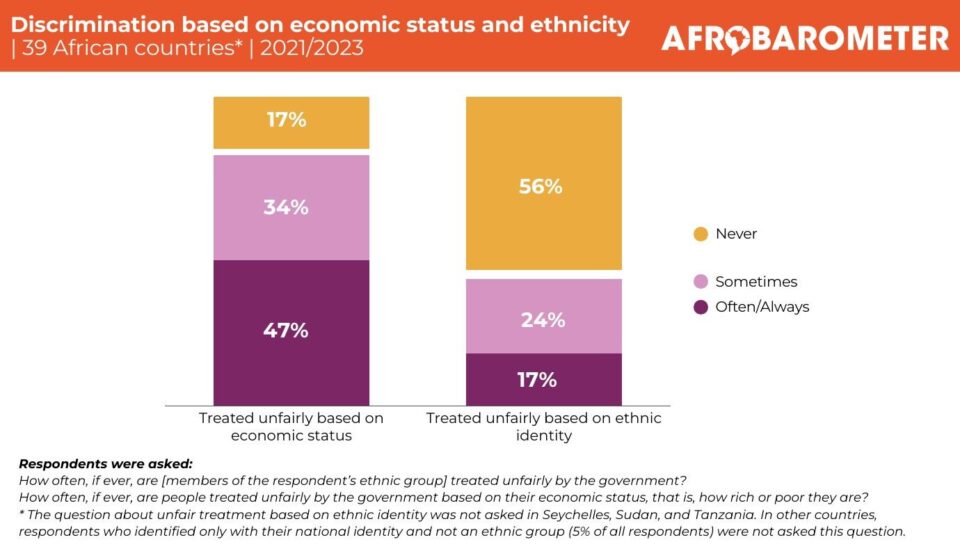A large majority of Africans express tolerance toward people of different ethnicities, religions, political affiliations, and nationalities, but only one in four feel comfortable living next door to someone in a same-sex relationship, the latest Afrobarometer Pan-Africa Profile reveals.
While majorities say they trust other groups of people at least “somewhat,” only relatives enjoy “a lot” of trust from a majority of respondents, and nearly half of respondents express little or no trust in people from other ethnic and religious backgrounds.
The report, based on 53,444 face-to-face interviews in 39 African countries, shows widespread perceptions of unfair treatment by governments, especially on the basis of people’s economic status.
Overall, Africans express a strong attachment to their national identities, but a majority consider their ethnic identities at least equally important.
Afrobarometer survey
Afrobarometer is a pan-African, non-partisan survey research network that provides reliable data on African experiences and evaluations of democracy, governance, and quality of life. Nine survey rounds in up to 42 countries have been completed since 1999. Round 9 surveys (2021/2023) cover 39 countries.
Afrobarometer’s national partners conduct face-to-face interviews in the language of the respondent’s choice that yield country-level results with margins of error of +/-2 to +/-3 percentage points at a 95% confidence level.
Key findings
On tolerance
- On average across 39 countries, at least eight in 10 Africans express tolerant attitudes toward people of different ethnicities (89%), different religions (85%), different political affiliations (82%), and different nationalities (80%). Only one-fourth (24%) say the same about people in same-sex relationships (Figure 1).
- Comparing regions, North Africa consistently ranks at or near the bottom in tolerance toward social differences, while Central and West Africa rank at the top (Figure 2).
On interpersonal trust:
- Relatives are the only people whom a majority (58%) of Africans say they trust “a lot.” But majorities say they at least “somewhat” trust neighbours, other citizens, people from different religious or ethnic backgrounds, and “other people you know” (Figure 3).
On discrimination:
- Six in 10 Africans (61%) say people are “often” or “always” treated unequally under the law (Figure 4).
- Almost half (47%) say their government “often” or “always” treats people unfairly based on how rich or poor they are – about three times as many as perceive widespread discrimination based on ethnicity (17%) (Figure 5).
On national vs. ethnic identity:
- Only 13% of Africans say they feel more attached to their ethnic identity than to their national identity. The largest share (45%) say they value both identities equally (Figure 6).
Charts
Figure 1: Social tolerance | 39 countries* | 2021/2023
Respondents were asked: For each of the following types of people, please tell me whether you would like having people from this group as neighbours, dislike it, or not care: People of a different religion? People from other ethnic groups? Homosexuals? Immigrants or foreign workers? People who support a different political party?
* The question about different ethnicities was not asked in Tunisia and Seychelles.
For more information, please contact:
Maame Akua Amoah Twum
Communications officer for anglophone West Africa and North Africa
Email: maameakua@afrobarometer.org
Telephone: +233 208 326 343
Visit us online at www.afrobarometer.org.
Follow our releases on #VoicesAfrica.

